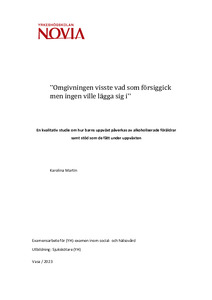”Omgivningen visste vad som försiggick men ingen ville lägga sig i” : en kvalitativ studie om hur barns uppväxt påverkats av alkoholiserande föräldrar samt stöd som de fått under uppväxten
Martin, Karolina (2023)
Martin, Karolina
2023
All rights reserved. This publication is copyrighted. You may download, display and print it for Your own personal use. Commercial use is prohibited.
Julkaisun pysyvä osoite on
https://urn.fi/URN:NBN:fi:amk-202305109141
https://urn.fi/URN:NBN:fi:amk-202305109141
Tiivistelmä
Det här examenarbetet handlar om barns uppväxt med alkoholiserade föräldrar där jag fokuserat på hur uppväxten drabbats samt hurdant stöd och hjälp barnen fått under uppväxten. Det finns alltför många barn som växer upp i dessa hemmiljöer och därför vill jag få fram i arbetet hur viktigt det är att söka rätt hjälp i tid.
Jag gjorde en kvalitativ studie och använde mig av en semistrukturerad intervju. I mitt arbete intervjuade jag fyra frivilliga deltagare som ville ställa upp på mitt examensarbete som växt upp med en förälder med alkoholmissbruk, intervjun utfördes under våren 2023. Jag använde mig av två frågeställningar för att få svar till mitt arbete, frågeställningarna var: Hur har det påverkat barn att växa upp i en familj med alkoholproblem? Vilket stöd har barn som växt upp i en familj med alkoholproblem fått? Från intervjuarna gjordes en kvalitativ innehållsanalys. Teoretiska utgångspunkten som jag använde mig av var KASAM som är skriven av Antonovsky (1987).
Alla deltagare hade unika individuella hemmiljöer och alla hade olika typer av uppväxter samt olika former av stöd och hjälp som erbjudits. Det framkom även fall där deltagare inte alls hade fått någon form av hjälp eller stöd under uppväxten. De flesta deltagare hade svårt att våga visa känslor och vara sig själva. Framöver detta hade flera deltagare väldigt svårt att söka hjälp vid behov under barndomen, men i vuxen ålder har det hänt sig att de vänt sig till professionell hjälp. This thesis is about children growing up with alcoholic parents. I have focused on how the childhood was affected and how much support and help the children received during their childhood. There are too many children who grow up in these home environments and I want to highlight in my work how important it is to seek the right help in time.
I did a qualitative study and used a semi-structured interview. In this thesis, I interviewed four voluntary members who grew up with a parent with alcohol abuse, the interview was conducted in the spring of 2023. I used two questions to seek answers to my work and the questions were: How has it affected the children to grow up in a family with alcohol problems? What support does children who have grown up in a family with alcohol problems receive? A qualitative content analysis was made from the interviews. The theoretical basis that I used was KASAM, which is written by Antonovsky (1987).
All participants had different home environments, and all had different upbringings and types of support and help they received. Some participants had not received any help or support at all during their upbringing. Some connections from the theory emerged in the interviews, such as most participants having difficulty showing emotions and being themselves. Another thing that emerged among the participants was that they found it difficult to seek help. In adulthood they have turned to professional help but during childhood they did not dare to seek help.
Jag gjorde en kvalitativ studie och använde mig av en semistrukturerad intervju. I mitt arbete intervjuade jag fyra frivilliga deltagare som ville ställa upp på mitt examensarbete som växt upp med en förälder med alkoholmissbruk, intervjun utfördes under våren 2023. Jag använde mig av två frågeställningar för att få svar till mitt arbete, frågeställningarna var: Hur har det påverkat barn att växa upp i en familj med alkoholproblem? Vilket stöd har barn som växt upp i en familj med alkoholproblem fått? Från intervjuarna gjordes en kvalitativ innehållsanalys. Teoretiska utgångspunkten som jag använde mig av var KASAM som är skriven av Antonovsky (1987).
Alla deltagare hade unika individuella hemmiljöer och alla hade olika typer av uppväxter samt olika former av stöd och hjälp som erbjudits. Det framkom även fall där deltagare inte alls hade fått någon form av hjälp eller stöd under uppväxten. De flesta deltagare hade svårt att våga visa känslor och vara sig själva. Framöver detta hade flera deltagare väldigt svårt att söka hjälp vid behov under barndomen, men i vuxen ålder har det hänt sig att de vänt sig till professionell hjälp.
I did a qualitative study and used a semi-structured interview. In this thesis, I interviewed four voluntary members who grew up with a parent with alcohol abuse, the interview was conducted in the spring of 2023. I used two questions to seek answers to my work and the questions were: How has it affected the children to grow up in a family with alcohol problems? What support does children who have grown up in a family with alcohol problems receive? A qualitative content analysis was made from the interviews. The theoretical basis that I used was KASAM, which is written by Antonovsky (1987).
All participants had different home environments, and all had different upbringings and types of support and help they received. Some participants had not received any help or support at all during their upbringing. Some connections from the theory emerged in the interviews, such as most participants having difficulty showing emotions and being themselves. Another thing that emerged among the participants was that they found it difficult to seek help. In adulthood they have turned to professional help but during childhood they did not dare to seek help.
